Student Profiles
PhD in Health Data Science - Biostatistics

Qihang Wu
Email: qihang [dot] wu![]() gwu [dot] edu
gwu [dot] edu
Start year: 2023
Qihang was born in Fujian, China. He earned his BS degree from Fuzhou University. In 2018, he attended the University of California Davis as an exchange student for a full senior year. After graduation, he worked consecutively at Sanofi and Yidu Cloud Tech in Shanghai. He obtained an MS degree in Biostatistics from the Mailman School of Public Health at Columbia University in 2023. Currently, he is pursuing his PhD in Health Data Science (Applied Biostatistics track) and serves as a biostatistician at the GWU Biostatistics Center. His current research interests lie in clinical trials and data science in biomedical studies.
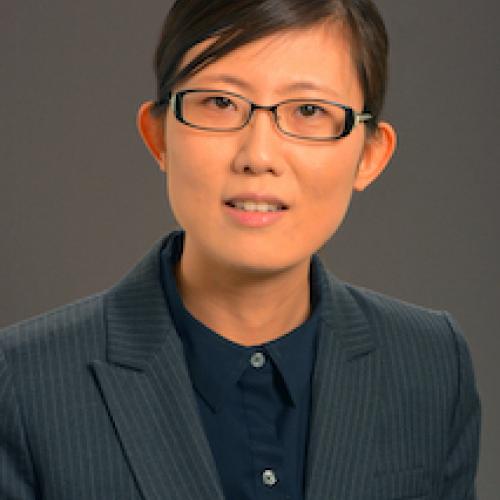
Shanshan Liu
Email: shanshanliu![]() email [dot] gwu [dot] edu
email [dot] gwu [dot] edu
Start Year: 2022.
Shanshan Liu, MS, MPH, is a PhD student in the Health Data Science program with a concentration in Applied Biostatistics starting in 2022.
Before joining GW, she worked as a Biostatistician at Boston Children's Hospital for 6 years, where she gained experience in health services research, surveys, cost-effectiveness analysis, design and analysis of observational studies, electronic health records, and collaborative research in general. Her current research interests include missing data, causal inference, and applications of statistical methods in medical and public health research. Shanshan earned her BS in Pharmaceutical Sciences from Sun Yat-sen University, and her master’s degrees in Epidemiology and Biostatistics from Tufts University.
Complete list of publications on Google Scholar: https://scholar.google.com/

Lizhao (Agnes) Ge
Email:lzge![]() gwu [dot] edu ( lzge[at]gwu[dot]edu)
gwu [dot] edu ( lzge[at]gwu[dot]edu)
Start year: 2021
Lizhao was born and raised in Zhejiang, China. She came to the United States for undergraduate studies at the University of Iowa, where she obtained a BS in Mathematics and a BBA in Finance, and a minor in Music. She earned a Master of Applied Statistics from the Pennsylvania State University and worked there as a Statistical Consultant after graduation. She joined the Antibacterial Resistance Leadership Group (ARLG) at the George Washington University Biostatistics Center as a biostatistician in 2020 and started her PhD journey in the Health and Biomedical Data Science (Applied Biostatistics track) in 2021. Her research interests are clinical trial designs, and application of the Desirability of Outcome Ranking (DOOR) in biomedical studies.

Shiyu Shu
Email: shishu![]() gwu [dot] edu (shishu[at]gwu[dot]edu)
gwu [dot] edu (shishu[at]gwu[dot]edu)
Start year: 2021
Shiyu (Richard) was born and raised in Dalian, China, and has been studying in the United States for the last 7 years. He obtained a BA in Mathematics and in Economics from Vassar College, during which he spent one semester as an exchange student at St Edmund Hall, Oxford University. He then received a Master of Statistical Practice from Carnegie Mellon University, and worked as a data analyst for a healthcare organization in rural Arizona during the peak of the COVID pandemic. The work experience motivated him to pursue a career in public health, and to continue his PhD studies in the Health and Biomedical Data Science program at GWU. He is currently a biostatistician working in the Diabetes Prevention Program team (DPP) at the Biostatistics Center, under the supervision of Dr. Marinella Temprosa. His current research interests include machine learning/data science, genomics data and survival analysis.

Yijie He
Email:lzge![]() gwu [dot] edu ( )yih148
gwu [dot] edu ( )yih148![]() gwu [dot] edu (yih148[at]gwu[dot]edu)
gwu [dot] edu (yih148[at]gwu[dot]edu)
Start year: 2021
Yijie was born in China. Before coming to the George Washington University, he received a BS degree in Bioengineering from University of California San Diego and an MS degree in Biostatistics from Duke University. He is currently a PhD student in Health and Biomedical Data Science, in the Applied Biostatistics track, and he also works at the George Washington University Biostatistics Center as a biostatistician. His current research interests include clinical trials, high-dimensional data, and data science.

Shanshan Zhang
Email: shanshan789789![]() gwumail [dot] gwu [dot] edu (shanshan789789[at]gwmail[dot]gwu[dot]edu)
gwumail [dot] gwu [dot] edu (shanshan789789[at]gwmail[dot]gwu[dot]edu)
Start year: 2021
Shanshan was born and raised in China. She earned a Bachelor of Medicine and a Master of Science in Cell Biology from China Medical University. When she came to the United States in 2018, she transferred her interests to public health, since a doctor can save individuals, whereas a public health expert can save lives on a population level. She obtained a second graduate degree, an MS in Biostatistics from the George Washington University. Shanshan hopes that she can make contributions to the field of public health, especially in designing and conducting clinical trials during the PhD program, and can work as an outstanding biostatistician in the future.
Recent Publications:
Qiongfang Wu, Leizhen Xia, Lifeng Tian, Shanshan Zhang, Jialyu Huang. Hormonal replacement treatment for frozen-thawed embryo transfer with or without GnRH agonist pretreatment: a retrospective cohort study stratified by times of embryo implantation failures. Accepted by Frontiers in Endocrinology. 5 January 2022
Shanshan Zhang. Biostatistics in Clinical Decision Making: What can We Get from a 2× 2 Contingency Table. E3S Web of Conferences (Vol. 233). EDP Sciences. December 2020
Qiqiang Guo, Shanshan Wang, Shanshan Zhang, Hongde Xu, Xiaoman Li, et al. ATM‐CHK 2‐Beclin 1 Axis Promotes Autophagy to Maintain ROS Homeostasis Under Oxidative Stress. The EMBO Journal, 39(10), e103111. 18 March 2020

Wanying Shao
Email: wanying_shao![]() gwu [dot] edu (wanying_shao[at]gwu[dot]edu)
gwu [dot] edu (wanying_shao[at]gwu[dot]edu)
Start year: 2022
Wanying was born and raised in Guangdong, China. Before enrolling at the George Washington University, she earned a BS degree in Information and Computing Science from the South China University of Technology and an MS degree in Biostatistics from the University of Connecticut. After graduating from UConn, she worked as a statistical programmer for a CRO company in the pharmaceutical industry for one year. She is currently a PhD student in Health and Data Science (Applied Biostatistics track) and also works as a biostatistician for the Antibacterial Resistance Leadership Group (ARLG) and the REACT study at the Biostatistics Center. Her research interests include clinical trial design and observational studies.
Xun Liu
Email: xun_liu![]() gwmail [dot] gwu [dot] edu (xun_liu[at]gwmail[dot]gwu[dot]edu)
gwmail [dot] gwu [dot] edu (xun_liu[at]gwmail[dot]gwu[dot]edu)
Start year: 2022
Xun was born and raised in Liaoning, China. Before coming to the George Washington University, She received a BS degree in Biopharmaceuticals at Huazhong University of Science and Technology and a MS degree in Biostatistics at New York University. She joined the George Washington University as a PhD student in 2022, and she also worked as a part-time biostatistician at GW’s Biostatistics Center. Her research interests include survival analysis and data science.

Ruoer Bei
PhD in Health Data Science - Bioinformatics
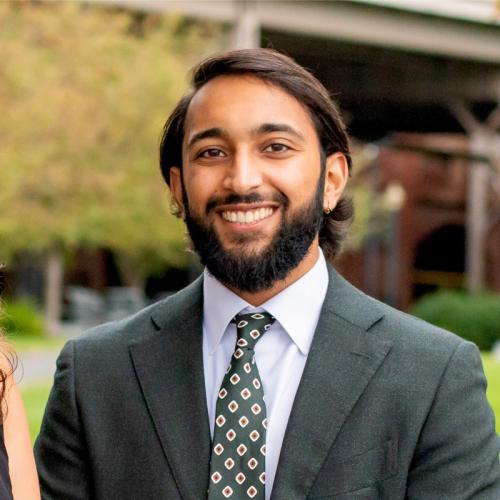
Chiraag Gohel
Email: chiraaggohel![]() gwu [dot] edu (chiraaggohel[at]gwu[dot]edu)
gwu [dot] edu (chiraaggohel[at]gwu[dot]edu)
Start year: 2022
BA in Statistics from Carleton College in Northfield, Minnesota
Worked for two years as a post-bac for the Laboratory of Neurogenetics at the NIAAA, providing bioinformatics and biostatistics support for a variety of single cell RNA-seq projects.
“ I am currently working on software for the normalization, batch-correction, and drift adjustment of LC-MS metabolomics data. Our goal is to provide easy to use tools that allow researchers to combine, compare, and perform meta-analyses of multiple large scale metabolomics datasets.”
Publications:
Gao C, Gohel C, Leng Y, Ma J, Goldman D, Levine, A.J, Penzo, M.A
Molecular and spatial profiling of the paraventricular nucleus of the thalamus.
eLife. 2023- Sambo D, Gohel C, Yuan Q, Sukumar G, Alba C, Dalgard C.L, Goldman D
Cell type-specific changes in Wnt signaling and neuronal differentiation in the developing mouse cortex after prenatal alcohol exposure during neurogenesis.
Frontiers in Cell Development Biology. 2022
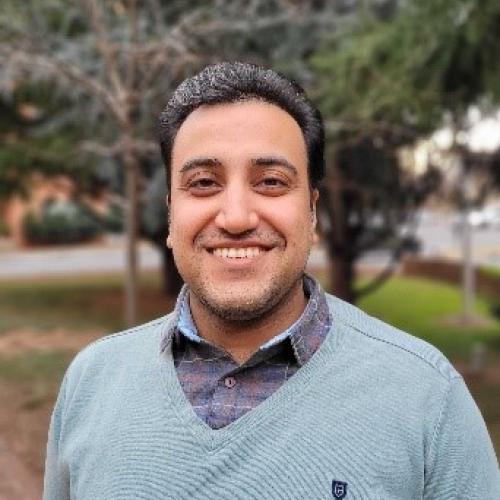
Mahdi Baghbanzadeh
Email: mahdi [dot] baqbanzadeh![]() gmail [dot] com (mahdi[dot]baqbanzadeh[at]gmail[dot]com); mbagh
gmail [dot] com (mahdi[dot]baqbanzadeh[at]gmail[dot]com); mbagh![]() gwu [dot] edu (mbagh[at]gwu[dot]edu)
gwu [dot] edu (mbagh[at]gwu[dot]edu)
Start year: 2021
Mahdi Baghbanzadeh is a Ph.D. student in the health and biomedical data science program at the Milken Institute School of Public Health at the George Washington University. Mahdi received his MS in Mathematical Statistics from Shiraz University in 2012, and his BS in Statistics from Shahid Beheshti University in 2010. Before joining GWU, he had the experience of 7 years performing in an analytical role ranging from data analyst to senior data scientist in multiple companies. His research interests are applying machine learning algorithms in analyzing omics data, developing tools for studying the genotype-phenotype association studies, and the effects of different medications on a certain disease.
Publications:
Baghbanzadeh, Mostafa; Simeone, F. C.; Bowers, C. M.; Liao, K.-C.; Thuo, M. M.; Baghbanzadeh, Mahdi; Miller, M.; Carmichael, T. B.; Whitesides, G. M.* “Odd-even effects in charge transport across n-alkanethiolate-based SAMs” Journal of American Chemical Society, 2014, 136, 16919–16925.
Mahdi Baghbanzadeh, Dewesh Kumar, Sare I. Yavasoglu, Sydney Manning, Ahmad Ali Hanafi-Bojd, Hassan Ghasemzadeh, Ifthekar Sikder, Dilip Kumar, Nisha Murmu, Ubydul Haque* “Malaria Epidemics in India: Role of Climatic Condition and Control Measures” Science of the Total Environment, 2020, 712, 136368.
Peeri, Noah C., Nistha Shrestha, Md Siddikur Rahman, Rafdzah Zaki, Zhengqi Tan, Saana Bibi, Mahdi Baghbanzadeh, Nasrin Aghamohammadi, Wenyi Zhang, and Ubydul Haque. "The SARS, MERS and novel coronavirus (COVID-19) epidemics, the newest and biggest global health threats: what lessons have we learned?" International Journal of Epidemiology, 2020, 49, 717-726.
Md Siddikur Rahman, Ajlina Karamehic-Muratovic, Mahdi Baghbanzadeh, Miftahuzzannat Amrin, Sumaira Zafar, Nadia Nahrin Rahman, Sharifa Umma Shirina, Ubydul Haque, “Climate change and dengue fever knowledge, attitudes and practices in Bangladesh: a social media–based cross-sectional survey”, Transactions of The Royal Society of Tropical Medicine and Hygiene, 2021, 115, 85-93.
Nistha Shrestha, Muhammad Yousaf Shad, Osman Ulvi, Modasser Hossain Khan, Ajlina Karamehic-Muratovic, Uyen-Sa D.T. Nguyen, Mahdi Baghbanzadeh, Robert Wardrup, Nasrin Aghamohammadi, Diana Cervantes, Kh. Md Nahiduzzaman, Rafdzah Ahmed Zaki, Ubydul Haque, “The impact of COVID-19 on globalization”, One Health, 2020, 100180.
Osman Ulvi, Ajlina Karamehic-Muratovic, Mahdi Baghbanzadeh, Ateka Bashir, Jacob Smith, Ubydul Haque, “Social Media Use and Mental Health: A Global Analysis”, Epidemiologia, 2022, 3 (1), 11-25.

Ranojoy Chatterjee
Email: ranojoy![]() gwu [dot] edu (ranojoy[at]gwu[dot]edu); ranojoy1chatterjee
gwu [dot] edu (ranojoy[at]gwu[dot]edu); ranojoy1chatterjee![]() gmail [dot] com (ranojoy1chatterjee[at]gmail[dot]com)
gmail [dot] com (ranojoy1chatterjee[at]gmail[dot]com)
Start year: 2021
Ranojoy is originally from Kolkata, India. He got his B.Tech in Computer Science from WBUT and has an MS in Computer Science from Kansas State University, specializing in recommendation systems using a multi-armed bandit approach. After graduation he worked at Bellwethr, Inc developing a retention engine which was later patented by the company. After his brief stint in industry, he worked as a research specialist in Rahlab to develop machine learning tools for analyzing Covid-19 data. His current research interests are graph neural networks, single cell data and prediction systems in biomedical data science.
Publications:
Amritphale, A., Chatterjee, R., Chatterjee, S. et al. Predictors of 30-Day Unplanned Readmission After Carotid Artery Stenting Using Artificial Intelligence. Adv Ther 38, 2954–2972 (2021). https://doi.org/10.1007/s12325-021-01709-7
Chow JH, Rahnavard A, Gomberg-Maitland M, Chatterjee R, et al. Association of Early Aspirin Use With In-Hospital Mortality in Patients With Moderate COVID-19. JAMA Netw Open. 2022;5(3):e223890. doi:10.1001/jamanetworkopen.2022.3890

Erika Hubbard
Email: ehubbard28![]() gwu [dot] edu (ehubbard28[at]gwu[dot]edu)
gwu [dot] edu (ehubbard28[at]gwu[dot]edu)
Start year: 2021
Erika was born and raised in Fairfax County, Virginia (NOVA) and earned her BSc in Biomedical Engineering with minor concentrations in Applied Mathematics and Engineering Business from the University of Virginia. Upon graduation she went on to intern and work for AMPEL BioSolutions, LLC in Charlottesville, VA, researching autoimmune and inflammatory diseases, primarily systemic lupus erythematosus (SLE). As a dual member of the systems biology and bioinformatics teams at AMPEL she developed an interest in leveraging genomics data to gain insights into mechanisms of autoimmune disease pathogenesis. She continues to work with AMPEL to study lupus and translate findings into novel clinical tools to further precision medicine.
Recent Publications:
Hubbard EL, Pisetsky DS, Lipsky PE. Anti-RNP antibodies are associated with the interferon gene signature but not decreased complement levels in SLE. Ann Rheum Dis [Epub ahead of print: 3 Feb 2022]. doi: https://doi.org/10.1136/annrheumdis-2021-221662
Hubbard EL, Grammer AC, Lipsky PE. Transcriptomics data: pointing the way to subclassification and personalized medicine in systemic lupus erythematosus. Curr Opin Rheumatol [Internet]. 2021 Nov 1;33(6):579-85. doi: https://doi.org/10.1097/bor.0000000000000833
Daamen AR, Bachali P, Owen KA, Kingsmore KM, Hubbard EL, Labonte AC, et al. Comprehensive transcriptomic analysis of COVID-19 blood, lung, and airway. Sci Rep [Internet]. 2021 Mar 29;11(1):7052. doi: https://doi.org/10.1038/s41598-021-86002-x
Hubbard EL, Catalina MD, Heuer S, Bachali P, Geraci NS, et al. Analysis of gene expression from systemic lupus erythematosus synovium reveals myeloid cell-driven pathogenesis of lupus arthritis. Sci Rep [Internet]. 2020 Oct 15;10(1):17361. doi: https://doi.org/10.1038/s41598-020-74391-4

Clark Gaylord
Email: cgaylord![]() email [dot] gwu [dot] edu (cgaylord[at]gwu[dot]edu)
email [dot] gwu [dot] edu (cgaylord[at]gwu[dot]edu)
Start year: 2021
After receiving M.S. degrees in Mathematics and Statistics from the University of Virginia and Virginia Tech, respectively, Clark has had a career in information technology, network security, and research computing. Over the last 20 years, Clark has led the design and operation of many research computing and big data research systems, and is a consulting statistician on several research projects. While at Virginia Tech, Clark taught several courses in Statistics, Data Science, and Networking. A PhD candidate in GW's Health and Biomedical Data Science, Bioinformatics Track, Clark is also Director of Research Technology Services in GW IT.
Websites:
CAAREN: https://www.caaren.org/clark-gaylord
GW High Performance Computing: https://www.hpc.arc.gwu.edu/
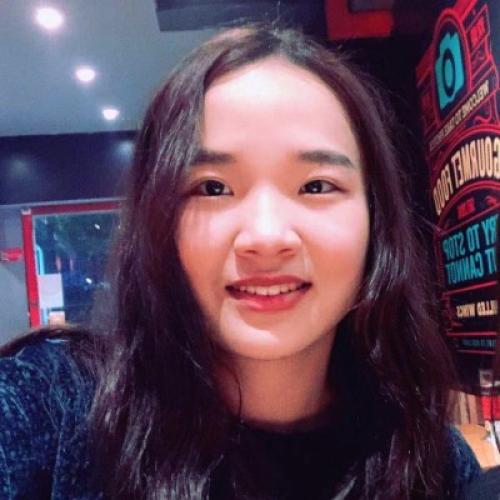
Xinyang Zhang
Email: xinyangz![]() gwmail [dot] gwu [dot] edu (xinyangz[at]gwu[dot]edu); kathyzhang415
gwmail [dot] gwu [dot] edu (xinyangz[at]gwu[dot]edu); kathyzhang415![]() gmail [dot] com (kathyzhang415[at]gmail[dot]com)
gmail [dot] com (kathyzhang415[at]gmail[dot]com)
Start year: 2021
Xinyang was born and raised in Jiangsu, China. Before coming to George Washington University, she obtained her MS in Data Informatics at the University of Southern California, Los Angeles. For now, she started her Ph.D. journey in Health and biomedical data science (Applied Bioinformatics track) and works for the Computational Biology Institute (CBI) as a Research Assistant. Her research interest focuses on microbiome analysis, omics data for the COVID-19, and reference-grade pathogen sequences database construction.

Rebecca Monachelli
Email: Rebecca [dot] Monachelli![]() gwu [dot] edu (Rebecca[dot]Monachelli[at]gwu[dot]edu)
gwu [dot] edu (Rebecca[dot]Monachelli[at]gwu[dot]edu)
Start year: 2025

Hui (Wendy) Wen
Email: wwen![]() bsc [dot] gwu [dot] edu (wwen[at]bsc[dot]gwu[dot]edu)
bsc [dot] gwu [dot] edu (wwen[at]bsc[dot]gwu[dot]edu)
Start year: 2022
Wendy was originally from China and has been a part of the George Washington University community since 2016, where she pursued a Bachelor's degree in Statistics and an MPH in Biostatistics. Currently, she is advancing her academic career as a Ph.D. student in the Health Data Science program at GWU. Wendy has been contributing as a biostatistician at the university's Biostatistics Center since 2021, working on significant research projects such as the Treatment Options for Type 2 Diabetes in Adolescents & Youth (TODAY) and the Glycemia Reduction Approaches in Diabetes: A Comparative Effectiveness Study (GRADE). Her research interests lie in the fields of machine learning, longitudinal analysis, and survival analysis, where she seeks to blend analytical rigor with impactful health outcomes.

Salwa Elsaadawy
Email: salwa [dot] elsaadawy![]() gwmail [dot] gwu [dot] edu
gwmail [dot] gwu [dot] edu
Start year: 2025
Salwa was born and raised in Alexandria, Egypt. She earned her Bachelor of Dental Medicine and Surgery (BDS) from Alexandria University, where her clinical training sparked an interest in the biological mechanisms behind health and disease. Motivated to pursue research that could impact public health on a broader scale, she later completed a Master’s in Bioinformatics at Georgetown University.
During her time as a research intern at the National Institute of Standards and Technology (NIST), Salwa investigated the influence of diet on antimicrobial resistance in the human microbiome. She processed microbiome sequencing data and used tools like RESFINDER and R to identify and visualize antimicrobial resistance gene patterns.
She is currently working at the National Eye Institute (NIH/NEI), where she analyzes RNA sequencing data and DNA methylation to study retinal aging and degeneration. Her work includes developing a retina-specific epigenetic clock and examining gene expression in CLRN1-related disease models.
Salwa’s research interests include epigenetics, transcriptomics, microbiome data analysis, and the integration of multi-omics data to explore aging and disease pathways. She is excited to further her training in statistical modeling, machine learning, and systems biology through the Health Data Science PhD program at GW.

Matthew Mollerus
Email: matthew [dot] mollerus![]() email [dot] gwu [dot] edu (matthew[dot]mollerus[at]email[dot]gwu[dot]edu)
email [dot] gwu [dot] edu (matthew[dot]mollerus[at]email[dot]gwu[dot]edu)
Start year: 2024
Matthew is a PhD student in the Health Data Science program. He received his M.S. in Data Science from the University of California, Berkeley and his B.A. in History and Literature from Harvard University. Before joining GWU, he worked as a data scientist at several global health and international development organizations. His research interests include using machine learning to understand sequence data and developing tools to predict phenotype from genotype with applications to infectious diseases.

Isabel (Isa) Berdecio
Email: iberdecio3![]() gwmail [dot] gwu [dot] edu (iberdecio3[at]gwmail[dot]gwu[dot]edu)
gwmail [dot] gwu [dot] edu (iberdecio3[at]gwmail[dot]gwu[dot]edu)
Start year: 2025
Born and raised in Massachusetts, Isa is a PhD student in Health Data Science & Bioinformatics at the Milken Institute of Public Health. Isa has a Bachelors of Science in Public Health, and a Master's of Science in Health Data Science & Bioinformatics - both from the George Washington University. Isa has over 4 years of experience in public health, having worked in rare disease advocacy, nicotine and tobacco cessation, biological aging analysis, and virology research. Isa currently works on contract at the National Cancer Institute to support large-scale scientific initiatives in the Tobacco Control Research Branch (TCRB), the Division of Cancer Control & Population Sciences (DCCPS), and the Behavioral Research Program (BRP).
PUBLICATIONS & CONFERENCES
Philippe-Auguste J, Berdecio I, Terry SF. Learning from the past: Discussing lessons from reproductive justice in the gene-editing sphere. Genetic Testing and Molecular Biomarkers. 2021;25(9):571-572. doi:10.1089/gtmb.2021.0217
Cha S, Amato MS, Papandonatos GD, Edwards G, Berdecio I, Jacobs MA, Graham AL. Changes over time in reasons for quitting vaping among treatment-seeking young people from 2019 to 2022. Addictive Behaviors Reports. 2024;19:100521. doi:10.1016/j.abrep.2023.100521
“Variant-Specific Spike Glycoprotein Analysis and Predictive Modeling for Informed SARS-CoV-2 Vaccine Development and Allocation,” 2024 BioCompute Workshop. FDA, Silver Spring, MD. May 2024.
MPH - Biostatistics and Bioinformatics
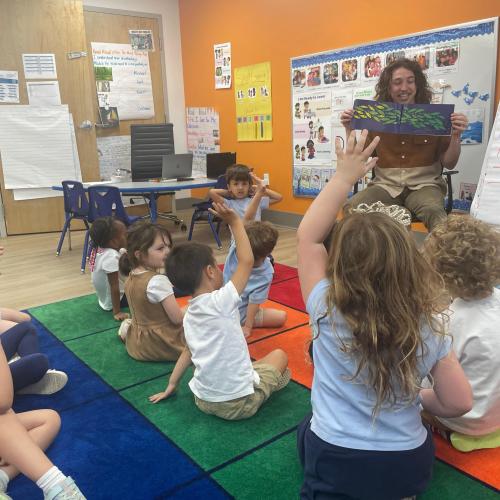
Winston Griffith
This summer Winston Griffith, a current MPH in Biostatistics graduate student, will be traveling overseas to Africa to partner with an organization called Rwanda Children. Rwanda Children is a community that provides daily shelter, food, education, medical care, and hope to at-risk Rwandan children. Winston is currently a preschool teacher in Washington, DC and is excited to serve in Rwanda Children's classrooms and with their children and youth ministries. Winston will also be working alongside their amazing medical clinic and health center where Rwanda Children has brought medical care to over 3,000 children and in the last year alone has seen over 15,000 patients who otherwise would not be able to seek out medical attention on their own. They have also partnered with the Rwandan government to bring in malnourished newborns and mothers to receive care and nourishment. With these amazing programs, Winston will be working alongside them assisting with systematic, organizational, and analytical needs. There are many needs to be met in Rwanda, and Winston will have the potential to help identify new ways in providing more targeted care to a larger population through the use of data analysis. Through his education at GWSPH with a concentration in biostatistics, Winston has learned how to compassionately implement data analysis and statistical methods towards creating a safer and healthier community, not only in DC, but globally.
If you are able to support Winston financially for his service abroad with Rwanda children, it would be greatly appreciated!
https://gofund.me/f313b944
MS in Health Data Science - Bioinformatics

Philip Appiah
Philip Yamoah Appiah is an aspiring public health professional with a Master of Public Health from the Ensign Global College and a Bachelor of Science in Human Biology from the University of Cape Coast. His extensive experience spans over a decade, including roles such as National and Regional Trainer, Field Supervisor, and Census Enumerator at the Ghana Statistical Service, where he played a pivotal role in the successful execution of the Ghana Population and Housing Census in both 2010 and 2021. In this capacity, he trained and supervised over 150 enumerators, ensuring the collection of accurate data from more than 150,000 respondents.
Philip has also served as a Partnership Facilitator at Compassion International Ghana, where he developed and implemented health and socio-economic interventions for over 5,000 vulnerable children and their caregivers across 14 communities. His expertise in designing and assessing monitoring and evaluation functions, as well as coordinating with specialists and government agencies, has been instrumental in addressing the developmental needs of these communities.
Earlier in his career, Philip worked as a Hospital Records Officer at Elmina Urban Health Centre, where he managed patient databases and facilitated efficient access to patient information for clinical staff.
With strong technical skills in data collection, community diagnosis, qualitative and quantitative research, and monitoring and evaluation, Philip is well-equipped to contribute effectively to research and public health initiatives.

